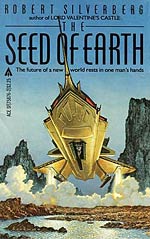
![]() charlesdee
charlesdee
6/20/2012
![]()
Silverberg expanded his short story "The Winds of Siros" to create this 1958 novel. He was, at the time, a self-professed writing machine, turning out short stories before lunch, a novel in less than a week, and writing under contract for most of the popular SF magazines. But the magazine market imploded around 1958, and he wanted The Seed of Earth to come out in hardback. That didn't happen. It became, like most of his novels, part of an Ace Double. His one consolation was that he was paired by editor Donald Wolheim with a selection of his own short stories rather than the work of a random writer.
In his preface to the 1976 paperback edition I read, Silverberg says, "I realize now that it is not the profound mixture of of adventure and human insight I thought it was at the time, but I still think it's an okay book." Without wanting to damn the book with the author's own faint praise, I couldn't agree more. This is straightforward SF delivered in functional, readable prose and not so much lacking as it is oblivious of literary or stylistic innovations. In the 22nd century, man has broken the speed of light, thanks to Einsteinian Drive technology, and earth feels the need to plant colonies on the thousands of habitable planets newly discovered among the millions of galaxies. The daily export of conscripted settlers is 6000 people, a statistically insignificant number among earth's 7 billion inhabitants. (We are just past 7 billion now, so Silverberg has been conservative in his calculations.) Of course no one wants to go, and why would they. Anyone under the age of 40 who is fertile and does not meet certain other disqualifying criteria can be picked by the random computer process and shipped off a week later, part of a fifty couple contingent that is expected to set up a colony, pair off, and start multiplying. They will neither return to earth nor receive further support from home.
Once I understood the premise here, I assumed that earth had succeeded in nothing more than creating hundreds of corpse-filled outposts light years away. Colonization continues to be a viable SF topic, but writers for decades have been concerned about how such a process might play out and have tried to explore logically consistent scenarios. But writers today are not turning out 40,000 word novels in a week the way Silverberg was fifty years ago. The twenty-three year old author was writing for a market that had only just begun to allow any sexual content into its product, and he seems more interested in the whole "pairing off" scenario than in developing a story about the colony that will extend past its first week or so on it new home.
But still, as Silverberg says, "it's an okay book." The first half of the book introduces four new Selectees, as the conscripts are called, and we get a quick picture of the society they are leaving and the mechanized process that will send them into space. The second half of the book is an expansion of the original short story. The uninhabited planet of Osiris turns out not to be so uninhabited. To say more would be to enter spoiler territory in a book that has only one real plot development.
http://www.potatoweather.blogspot.com